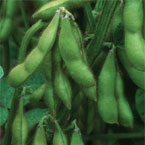Soy

On this page:
Introduction
This fact sheet provides basic information about soy—common names, what the science says, potential side effects and cautions, and resources for more information. The following information highlights what is known about soy when used by adults for health purposes.
Soy, a plant in the pea family, has been common in Asian diets for thousands of years. It is found in modern American diets as a food or food additive. Soybeans, the high-protein seeds of the soy plant, contain isoflavones—compounds similar to the female hormone estrogen. Traditional or folk uses of soy products include menopausal symptoms, osteoporosis, memory problems, high blood pressure, high cholesterol levels, breast cancer, and prostate cancer.
Soy is available in dietary supplements, in forms such as tablets and capsules. Soy supplements may contain isoflavones or soy protein or both. Soybeans can be cooked and eaten or used to make tofu, soy milk, and other foods. Also, soy is sometimes used as an additive in various processed foods, including baked goods, cheese, and pasta.
What the Science Says
- Research suggests that daily intake of soy protein may slightly lower levels of LDL ("bad") cholesterol.
- Some studies suggest that soy isoflavone supplements may reduce hot flashes in women after menopause. However, the results have been inconsistent.
- There is not enough scientific evidence to determine whether soy supplements are effective for any other health uses.
- NCCAM supports studies on soy, including its effects in cardiovascular disease and breast cancer, and on menopause-related symptoms and bone loss.
Side Effects and Cautions
- Soy is considered safe for most people when used as a food or when taken for short periods as a dietary supplement.
- Minor stomach and bowel problems such as nausea, bloating, and constipation are possible.
- Allergic reactions such as breathing problems and rash can occur in rare cases.
- The safety of long-term use of soy isoflavones has not been established. Evidence is mixed on whether using isoflavone supplements over time can increase the risk of endometrial hyperplasia (a thickening of the lining of the uterus that can lead to cancer). Studies show no effect of dietary soy on risk for endometrial hyperplasia.
- Soy's possible role in breast cancer risk is uncertain. Until more is known about soy's effect on estrogen levels, women who have or who are at increased risk of developing breast cancer or other hormone-sensitive conditions (such as ovarian or uterine cancer) should be particularly careful about using soy and should discuss it with their health care providers.
- Tell all your health care providers about any complementary health practices you use. Give them a full picture of what you do to manage your health. This will help ensure coordinated and safe care. For tips about talking with your health care providers about complementary and alternative medicine, see NCCAM's Time to Talk campaign.
Sources
- Balk E, Chung M, Chew P, et al. Effects of Soy on Health Outcomes. Evidence Report/Technology Assessment no. 126. Rockville, MD: Agency for Healthcare Research and Quality; 2005. AHRQ publication no. 05–E024–1.
- Low Dog T. Menopause: a review of botanical dietary supplements. American Journal of Medicine. 2005;118(suppl 12B):98S–108S.
- Sacks FM, Lichtenstein A, Van Horn L, et al. Soy protein, isoflavones, and cardiovascular health: an American Heart Association Science Advisory for professionals from the Nutrition Committee. Circulation. 2006;113(7):1034–1044.
- Soy. Natural Medicines Comprehensive Database Web site. Accessed at www.naturaldatabase.com on July 23, 2009.
- Soy (Glycine max [L.] Merr.). Natural Standard Database Web site. Accessed at www.naturalstandard.com on July 23, 2009.
For More Information
NCCAM Clearinghouse
The NCCAM Clearinghouse provides information on NCCAM and complementary health approaches, including publications and searches of Federal databases of scientific and medical literature. The Clearinghouse does not provide medical advice, treatment recommendations, or referrals to practitioners.
PubMed®
A service of the National Library of Medicine (NLM), PubMed® contains publication information and (in most cases) brief summaries of articles from scientific and medical journals.
Office of Dietary Supplements (ODS), National Institutes of Health (NIH)
ODS seeks to strengthen knowledge and understanding of dietary supplements by evaluating scientific information, supporting research, sharing research results, and educating the public. Its resources include publications (such as Dietary Supplements: What You Need to Know), fact sheets on a variety of specific supplement ingredients and products (such as vitamin D and multivitamin/mineral supplements), and the PubMed® Dietary Supplement Subset.
This publication is not copyrighted and is in the public domain. Duplication is encouraged.
* Note: PDF files require a viewer such as the free Adobe Reader.
